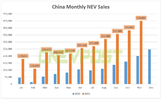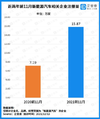- Joined
- 3 July 2009
- Posts
- 28,170
- Reactions
- 25,409
All the talk has been about the Tesla Cyberute, this Ford F 150 slipped under the radar.

 electrek.co
From the article:
electrek.co
From the article:
Ford confirmed that it now has nearly 200,000 reservations for its upcoming F-150 Lightning electric pickup truck. At this point, it represents roughly a three-year backlog. It might make it hard to get access to the vehicle.
Normally, we see a large number of reservations for a new EV early on, and it quickly tapers off. It looks like it’s not the case for the Ford F-150 Lightning.
Ford kept getting steady demand for the F-150 Lightning and added about 80,000 reservations for a total of 120,000 pre-orders by the end of July.
Last month, Ford reported 160,000 reservations for the electric pickup truck.
Now, just a month later, the automaker added an impressive 40,000 reservations for a total of around 200,000, according to a new presentation by Lisa Drake, Ford’s chief operating officer:
As we reported last month, a survey of F-150 reservation holders showed that 25% were replacing a gas-powered F-150 pickup truck.
40% are already EV owners and 11% are Tesla owners.
The demand is impressive, but it doesn’t sound like Ford is ready to meet it production-wise. Ford has previously shared plans to produce 15,000 Lightning trucks in 2022, 55,000 in 2023, and 80,000 in 2024.

Ford says it now has nearly 200,000 reservations for F-150 Lightning, or 3 years of backlog
Ford confirmed that it now has nearly 200,000 reservations for its upcoming F-150 Lightning electric pickup truck. At this point,...
 electrek.co
electrek.co
Ford confirmed that it now has nearly 200,000 reservations for its upcoming F-150 Lightning electric pickup truck. At this point, it represents roughly a three-year backlog. It might make it hard to get access to the vehicle.
Normally, we see a large number of reservations for a new EV early on, and it quickly tapers off. It looks like it’s not the case for the Ford F-150 Lightning.
Ford kept getting steady demand for the F-150 Lightning and added about 80,000 reservations for a total of 120,000 pre-orders by the end of July.
Last month, Ford reported 160,000 reservations for the electric pickup truck.
Now, just a month later, the automaker added an impressive 40,000 reservations for a total of around 200,000, according to a new presentation by Lisa Drake, Ford’s chief operating officer:
As we reported last month, a survey of F-150 reservation holders showed that 25% were replacing a gas-powered F-150 pickup truck.
40% are already EV owners and 11% are Tesla owners.
The demand is impressive, but it doesn’t sound like Ford is ready to meet it production-wise. Ford has previously shared plans to produce 15,000 Lightning trucks in 2022, 55,000 in 2023, and 80,000 in 2024.





